13 Music Reviews
The Besties, Singer (Skipping Stones)

The Besties' brand of pop music is catchy, fun, light and airy. The songs all have the same basic sound, with pleasant melodies gently buoyed by splendid harmonies. Their nine-song, 25-minute album Singer at first rushes past like a breeze, nearly vanishing into air. But then you'll find that the songs have stayed with you, that they're following you around, beckoning you to hear them again. It's a small album that wins you over in its unassuming, yet charming way. It's charming for how tuneful the songs are, for how they're playful and light, for how cohesive the album is as a whole, each song falling music in line with the others (symbolically demonstrated by the song titles all following a pattern: "Siren Song", "Prison Song", etc.). The playfulness of the Besties shines through also in their infatuation with imagination each song is set in a different fictional world, like kids playing dress-up. There's a "Pirate Song", a "Western Song", a "Space Song". At their core the songs are generally about love, infatuation, flirtation, and heartbreak affairs of the heart yet they're set in various worlds, a fun twist. One of the most infectious songs, fittingly so, is the "Zombie Song", where the singer falls in love with a zombie but doesn't want to fall too far in love: "zombie baby I love you / sometimes so much to want to be one of you." And while I'm often resistant to enjoy band theme songs, like the one Singer closes with ("Theme Song", of course), if one's ever called for this is the perfect time, as the Besties' choose-your-adventure-theme approach to songwriting makes an authorial, almost TV-like theme song a completely appropriate way to cap it all off. dave heaton
Meredith Bragg and the Terminals, The Departures EP (The Kora Records)
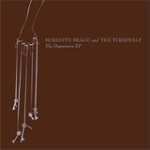
Meredith Bragg and the Terminals' The Departures EP isn't a departure, really, just a smartly packaged, fine showcase for Bragg's talent at writing intimate, hushed pop songs, in the same general vein as Death Cab for Cutie's Ben Gibbard, with a similar singing voice. But the songs are filled with characters making departures: leaving others behind (or getting left behind), searching for new beginnings, trying to start over. The most stirring of these is the most direct: "Let's Start Over", which has a sparse, immaculate arrangement of cello and percussion that perfectly pulls out the emotion, and the tune, in Bragg's tale of beginning again. In the world of The Departures EP, everyone is ultimately alone, to fend for him or herself. And that lends life a bittersweet feeling, one the music shares. "Postcard From Boston", which begins "we are all abandoned when the lights go out" encapsulates this feeling, while nicely turning on the image of a smile and pushing towards hope, as the music lightly tilts upward and the narrator tries to imagine that time can hold still on that smile. But hold it doesn't, and before the EP's time is up, even, that hopeful feeling of "Postcard From Boston"'s ending will lead back into melancholy, with a gorgeous, blue-shaded cover of Songs:Ohia's "Two Blue Lights." dave heaton
Carrie, Honey Blue Star (Static Discos)

Released by Tijuna-based electronic pop label Static Discos, Carrie's album Honey Blue Star gives us gorgeous layers of electronics and guitars to soak into like a warm bath. It sounds better the louder you play it, as it flows dreamily from the speakers, immersing us in sound. It's melodic, atmospheric, shimmering. And shining on top of it all is the voice of Carrie herself. Her voice is timid, almost child-like, on the one hand, and welcoming, alluring on the other. The lyrics read like little poems, small personal notes. She sings about her favorite pet (on the cheekily titled "Cat Power"), sings to a dream lover, sings about turning 21. Star imagery abounds, and fittingly so given the pristine and transportive qualities of the music. Carrie's music offers both a gentle sort of poetry and truly involving, lush soundscapes. dave heaton
Destroyer, Destroyer's Rubies (Merge)

Destroyer's last release, the Frog Eyes collaborative EP Notorious Lightning and Other Works, had a spark to it that I didn't get from its immediate predecessors. The new album Destroyer's Rubies (their sixth album) is less overtly possessed by weird energy, but ultimately it's even more fiery, and ten times more hypnotic. Instead of the hopped-up frenzy of that EP, Destroyer's Rubies has a refined stride to it, a typical Destroyer sound aided by an extra sense of clarity. The album's style is sweeping, romantic, and stylish, singer Dan Bejar coming off like an old-World dandy crossed with Robyn Hitchock, channeling Dylan. In other words, he sounds like an erudite surrealist, warped yet proper. The album glides us into its atmosphere with the 6-minute opener "Rubies", a fable/puzzle filled with oblique history. It rolls along beautifully, seven verses with no chorus, a line of questions with no answer. "Please don't wake me up form this / my golden slumber / I am proud to be a part of this number," Bejar declares with a wry smile, sharing in our pleasure. The entire album is tuneful and sensuous, but not geared around direct-to-us choruses. It rolls along in its own self-referential, vaguely historical, slightly nonsensical way. The music has a Band-like laidback country vibe, but also contains tropical hues, sea-chantey hints, and the occasional resemblance to '50s slow-dance balladry. That opening song "Rubies" has a line I keep remembering when thinking of this album "you disrupt the world's disorder just by virtue of your own grace". Destroyer's Rubies reflects that disorder and possesses quite the sense of grace. It's a beautiful album that's also purposely bizarre, purposely obstinate and independent. This might be heresy, but to me Destroyer's Rubies is much more interesting than those of Bejar's other, much more famous band the New Pornographers. It's endlessly fascinating actually, a grand affair. dave heaton
Liz Durrett, The Mezzanine (Warm)
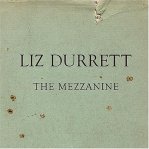
The fact that Liz Durrett's debut album Husk was mostly recorded a decade before its 2005 release made nearly every critic who reviewed it wonder how different her new music must sound. Her follow-up The Mezzanine was recorded in 2005, but retains the basic sound of her debut, albeit with stronger lyrics and richer song construction. That similarity is welcome, though, considering how striking that basic sound is. Like Husk, The Mezzanine (produced by Durrett's uncle Vic Chesnutt) exudes a certain haunted beauty in its slow pace, spare setting, and Durrett's quietly beguiling voice. Thoughts of ghosts keep coming to my mind as I listen. It's the way the level of space in the music makes me imagine she's singing in an empty mansion somewhere. It's the way her voice floats along slowly, with a sense of mystery in her delivery. It's the way that on one amazing song, "Marlene," her voice shoots for the rafters with her voice, rising up to an almost unearthly level, delivering non-words at the end like we're being sent a message in code. It's the way the piano on the brief instrumental "Silent Partner" feels like it's channeling memories from centuries past. It's how some of the songs in form resemble waltzes, lullabies, and other vehicles for memory. It's how when she sings on "No Apology" there's a creature, of ambiguous shape, made of feedback, occupying the song with her. But it's also in the lyrics themselves, in the spaces they leave as well as the allusions they make to lingering shadows. It's the way her song titles reference a "Shivering Assembly", "Knives at the Wall", and the creeping vine kudzu. In the title track she sings, "small things beat you down / til you could not leave the house"
later singing that even when you defeat them "they will always be in the mezzanine". Memories hang in the air, emotions stay potent, images persist in the mind. Liz Durrett's spellbinding songs seem to contain a multitude of places, moods, feelings, and lifetimes within them. dave heaton
El Hijo, La Piel Del Oso (Acuarela)

El Hijo = "the son". Abel Hernandez is the son of two great atmospheric pop bands from Spain, Migala and Emak Bakia. When he sings lead vocals for Migala his voice is part of a mighty sonic beast, with a big, layered sound. On this El Hijo EP La Piel Del Oso ("The Skin of the Bear") his voice's impressive tone is one of the first things you notice. His singing voice is deep and rich, like early Leonard Cohen if he were more of a crooner. Right from the start, this powerful voice leads us through a sweeping, romantic mix of song styles. Hernandez's voice is augmented by a lovely array of instruments, including guitars, glockenspiel, horns, and strings. The mood is mostly dour, yet still quite soft and beautiful. On the mid-EP track "Los Salvajes", strings come in like a rousing chorus, punctuating the mood with an extra element of drama. On the closing song "El Senor de las Bestias", the strings similarly are arranged in an emotional, mood-heightening way. Opener "Esa Musica Sombria" (roughly, "that gloomy music") begins like a piano-and-strings-laden lullaby, or an early morning dance through the city streets, and then swings in a busy, lightly jazzy but still dream-like way, before shifting back into its original slow, melancholy state. dave heaton
Northern, Your House and Mine (self-released)

"My father's worn-out shoes lying by the door / the TV almost drowns out the sound of his familiar snore," Chris Greiner sings, beginning the walk through memories of the past that is Northern's excellent Your House and Mine album. Moments, places, and interactions of the past fill the album, accompanied by a twilight mood and a hushed, gentle, country-and-western-tinged sound. The music is the perfect setting for these introspective songs it's shadowy, slow, and mostly acoustic, with violin, piano, and an array of other instruments. There's a stillness to the album which makes it all the more riveting, as a vivid atmosphere is wedded to just as vivid storytelling. Those stories take place in hotel rooms, on road trips, in childhood homes. They're stories of people leaving, being left, on the verge of falling apart, or looking for something, or someone, to save them. They're heartbreaking, moving, and recognizable as moments from your life. It's human music, in sound, style, and content, and it's unforgettable. dave heaton
The Online Romance, Hey Abraham 7" (Recursive Delete)
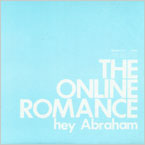
"Sadly, we inadvertently smashed that penny jar which rode in the trunk of her grandmother's car, and it wasn't 'til we arrive that I got a replacement." On paper they don't seem like fitting lyrics for a pop song, but when sung they sure do. Especially when sung by The Online Romance's Jack Saturn, in a sweet, sensitive voice, to a truly sublime melody, on top of a gentle, imminently pleasurable arrangement of instruments, with tambourines shaking, organ lending support to the tune, and acoustic guitars being strummed. It might be out of the ordinary to create a lush, catchy song that's directed towards your coins
but then, again, out of the ordinary is good, right? The two songs on the flip side of this 7" are just as fetching, with lyrics halfway between childhood memories and riddles, and tunes that dive headfirst into your brain. "Fork Number Two" is a radio hit observing a kid eating a meal, while "Leaves Know Nothing of Love" is that perfect record-ender
you know, the sweet, romantic, pretty song, with a bit of melancholy, but also hope, and of course mystery, and of course harmonies to die for? dave heaton
Our Hearts Beat Out of Tune (Yellow Mica)
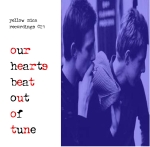
Our Hearts Beat Out of Tune is the perfect name for this indie-pop compilation, collecting as it does an international array of musicians headed in their own directions, Billboard be damned. It's an excellent collection from the Swedish label Yellow Mica, filled with superbly crafted songs, mostly previously unreleased, from DIY bands in Sweden and elsewhere. An alternate version of The Young Untold's snappy pop-rocker "The Angry Monarch" opens the CD, followed by a melancholy, tuneful ballad recorded on a home computer by Swedish singer/songwriter Happy Go Lucky. We Are Soldiers We Have Guns' contribution "Anchorless" isn't the macho work the band name might suggest, but a lovely piano ballad. Vermont's The Capstan Shafts throw us a typically fuzzy, typically brilliant rock song. Javelins'"You're Beautiful" is also typically brilliant, a ragged, minute-long, punk-rock love song. The omnipresent Boyracer rips through the nicely titled, catchy "The 90s Are Thru (Whining Boys With Acoustic Guitars)." There's a live, sing-along rendition of the Diskettes' "Museum." A similar fun mood runs through "Pettin' Dog" by the Port City Allstars. There's also tracks by August Schwartz, The Haircuts, Kin, Let's Be Honeys, Tokyo Eyes, and Birds of Galapagos, and then the whole thing comes to a smashing end with the off-kilter but fetching "There's Nothing to Celebrate" by The Second-Hand Furniture. A fantastic collection overall, tons of fun. dave heaton
Anthony Rochester, Music for Librarians (Radio Khartoum)
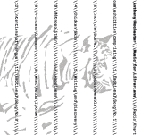
"And I never want to be without you beside the sea", Anthony Rochester sings over mellow, melancholy guitar strains at the start of "Emotional Song No. 1", beginning his album Music for Librarians with a sound appropriate for the image of a librarian as a shy, sensitive sort. But then he funks the song up a bit, with snazzy '70s keyboards and more of a groove, and you're thinking of library music, of obscure soundtracks to long-lost trash films, driven by synthesizers now dusty in attics and thrift stores. The general tone of the album is somewhere between those two associations his songs are sensitive and bittersweet, he sings his lyrics sweetly, yet there's a stylish, colorful sheen to it all, with a record collector's sense for the effect different sounds and styles have when layered together. As the album proceeds, it gets stylistically more diverse, echoing strains of Morriccone, lounge music, exotica, and porn soundtracks while retaining the general, Belle & Sebastian/Sarah Records-like tone of literate, sensitive pop balladry. dave heaton
Songs to Break God's Heart, Vol. 1 (Acuarela)

In the liner notes to the Acuarela compilation Songs to Break God's Heart, Vol 1, label manager Jesus Llorente expresses hesitancy about the whole affair. "Acuarela has never been too keen on releasing compilations," he writes. Even so, they've long showed a skill at compiling them, as on the three Acuarela Songs releases, which showed both a consistency of mood and a high level of quality. With exclusive songs and mixes impeccably arranged together, like a perfect, well-worn mix tape from a friend, >Songs to Break God's Heart is just as significant. It begins as a fantastic showcase for gentle, atmospheric pop, turning towards unique, experimental electronics instrumentals in the middle, and then seamlessly back towards equally unique pop. There's gorgeous contributions from the Zephyrs, Aroah, and The Strugglers. Tara Jane O'Neil & Miggy offer a fine rendition of Kristy Maccoll's "They Don't Know"; P:ano nicely covers an Ultravox song. There's excellent songs by Darren Hayman, Mecca Normal, The Secret Society, and more. Here's hoping that Acuarela never lets their worries about compilation album keep them from doing them, as this is an exemplary release, as good as compilations get. dave heaton
(The Sounds of) Kaleidoscope, self-titled (Hackshop)
"Because I am Haunted" is the right name for (The Sounds of) Kaleidoscope's lead-off track, a moody trip which creeps along with a psychedelic pace, haunted-house organs, and wailing guitars before exploding into a My Bloody Valentine-like storm cloud. And that's the general tone the group seems to be going for - the Spiritualized/MBV axis of atmosphere and dream-inducement. There's intense explosions of sound, layers of guitars, and a generally haze over everything. The more you listen, though, the more you hear that most of the songs themselves aren't especially trippy or spacebound. Beneath the clouds there's a song structure that's at times almost "classic rock" in nature - like a more compact, conventional version of Spacemen 3's most blues-based rock romps. There's songs throughout where the drums pound more like the Who than the shoegazers, and the guitars break into fairly conventional "guitar rock" solos. Ultimately the band is walking some line between resembling drugged-out astronauts and the bar band down the street. And that's an interesting place to be - space music you can pump your fist to. But if the songs themselves were a little more distinct, a little less in danger of being washed away under the waves of guitars, the end result might be even more interesting. - dave heaton
Work Clothes, These Are the Shoes We Wear (Fractured Discs)
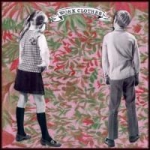
The opening instrumental "Green French Soaps" sets the tone for Work Clothes' debut album These Are the Shoes We Wear: melodic guitars softly chime within a low-key but gently luxurious setting, with percussion as its base and keyboards playfully circling. Work Clothes the Carrboro, North Carolina-based duo/married couple Jenny and Lee Waters use this sort of delicate, relaxed but richly textured music to tell stories from their lives. It's small music in the best sense: intimate, hushed pop music that within its humble confines communicates so much feeling and atmosphere. Jenny and Lee sing softly, together or separately, over their lovingly arranged, dreamy compositions. Their songs sometimes exude a bittersweet sense of looking-back at the past ("Fort Bragg Summers"), for good and for bad, and other times stand as pure expressions of love (the stirring "Over the Moon", with Lee declaring, straight-up, "Jenny I love you honey"). Work Clothes' songs are pretty but not precious; they're filled with love and hope, but also plenty of sadness, hurt, and anger, even. Recorded "over the course of a few years", These Are the Shoes We Wear sounds like two musicians offering a snapshot of their lives. It also sounds like a perfectly realized atmospheric pop album, full of warmth, heart, and melody. dave heaton
Copyright (c) 2006 erasing clouds |
|